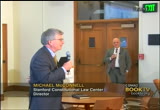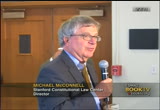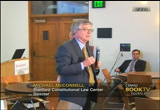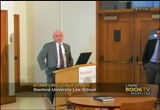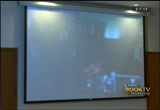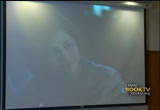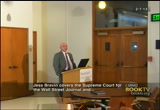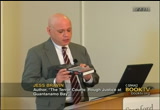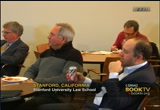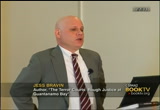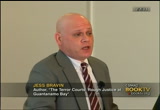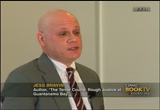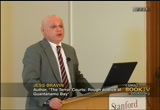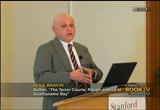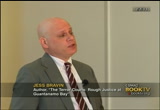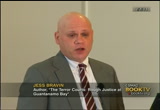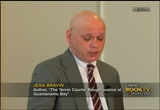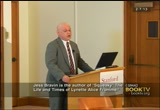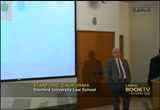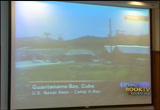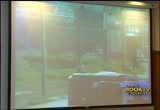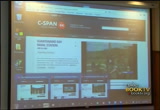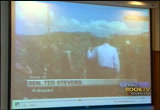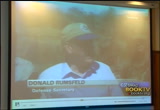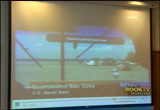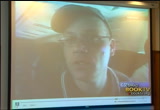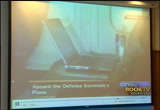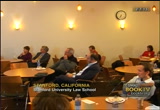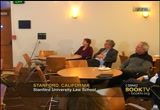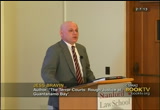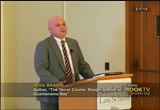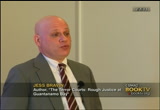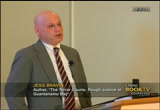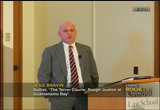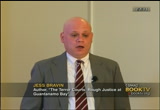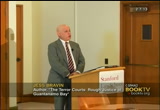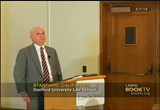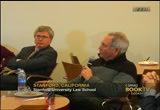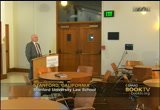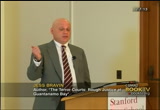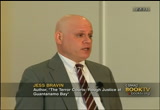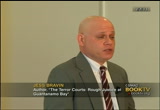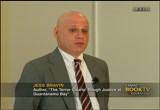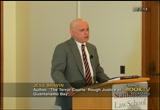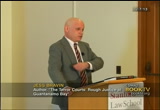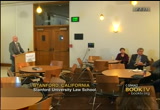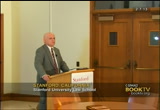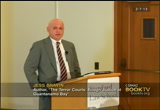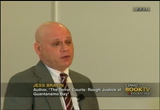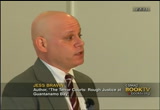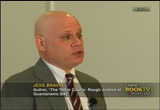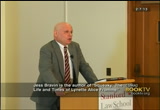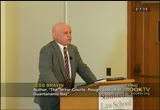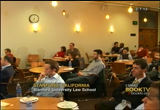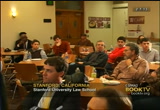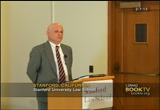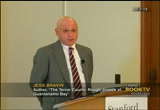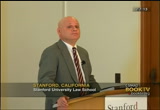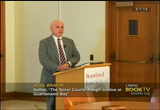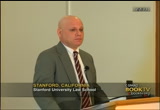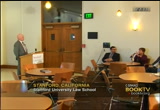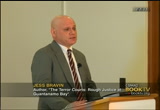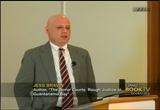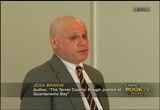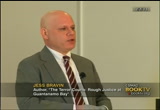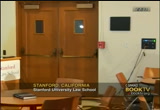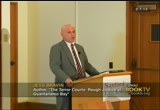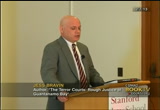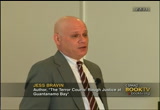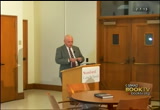tv Book TV CSPAN February 23, 2013 10:45am-12:00pm EST
10:45 am
booktv. he discusses the challenges facing military prosecutors as they work to prosecute suspected terrorists in this our military courts. this is about an hour, 15 minutes. >> so i'd like to begin by welcoming everyone to the first constitutional conversation of 2013 put on by the constitutional law center here at stanford. and it's my special pleasure to introduce our guest for tonight, jess bravin, of "the wall street journal" and author of the recent book "the terror courts," on sale, i should add, at better bookstores everywhere and even the stanford bookstore. so you may want to grab that. it's a -- this is probably the most serious account of what has actually happened in the court system in guantanamo and the
10:46 am
series of trials that have been taking place there. i'm not going to trespass on the subject matter because jess is going to give us a good taste of what he's been writing about. but i did want to introduce jess, the person. he's someone i got to know a few years ago when we were both traveling from washington, d.c. to to williamsburg, and the train, amtrak broke down, and we grabbed a car and rode down together and had just an extraordinarily enjoyable time because jess is, as i think most people know, one of the leading legal reporters in the united states. but what they may not know is his, you know, he's a person of extraordinary humor and wit. and so i want to expose a little
10:47 am
bit of that to you right now because when he was in college at harvard, he was roommates with, what, peter say gal of, wait, wait, don't tell me. and they were both members of not -- they were not the harvard crimson crowd, they were the harvard lampoon along with the head of the lampoon at that time, conan o'brien. i've been told this elaborate story, i'm not sure i'm going to be able to get all the details right about he and his cronies contriving to arrange an invitation to harvard to speak as a pan of letters the -- as a man of letters the actor who played robin in the batman movies. and while he was there somehow managing to pilfer his robin costume and then pretending to be the penguin, i think it is,
10:48 am
and negotiating for the return of this costume to the great hilarity of the entire cap pus. campus. so a mutual friend of ours who was the defense counsel for hamdan in his military commission trial in guantanamo described jess to me as something of a combination between edward r. murrow and dave letterman. so welcome, jess, and thanks for coming. >> well -- [applause] am i on? thanks. i was going to say that i didn't realize that judge mcconnell was going to mention that or car trip. i was going to say that he was forced to take a two-hour car trip with me and invited me here anyway, so showing you his judicial temperament and good spirits.
10:49 am
just for the record, it was burt ward who played robin in the batman television series. for those who want the exact details on that episode, look for my next book. [laughter] but tonight's topic is a bit more serious, so before getting into it, i thought perhaps an important documentary moment would be best for beginning the evening. so, nathan, if you could, please, hit the lights and show us our first, our first clip. >> i don't want to spill anything on it. >> nice. >> vegetables. >> can i help? >> no, we'll take care -- >> can we see it? do we need to turn off more lights? >> well, the --
10:50 am
[inaudible] >> the answer is, yes. during world war ii six german saboteurs were tried -- [inaudible] the supreme court upheld it. >> in the civil war the supreme court criticized -- >> that's because they included u.s. citizens. [inaudible] excluded u.s. citizens when -- >> that's got to be their opening salvo. >> i don't think the admiral's going to want to tell the judges they handle it that way. >> [inaudible] >> that's a waste of time. look, we have very little facts in the case. they're so sensitive that we don't even get them -- [inaudible] my responsibility. >> who made you first chair? >> the admiral mentioned my name. >> so? >> all right. i'll tell you what, we'll flip for it. >> okay.
10:51 am
>> call it. >> heads. yeah, but -- [inaudible] [inaudible conversations] >> well, that, that's one of many, many dramatic representations of the military commission's project at guantanamo, and one thing that we learn from it is that the people involved are extraordinarily good looking. [laughter] it's actually from the television show "jag" which no longer is on the air, but it would take its storylines from cases, mainly military cases that took place, and that episode, called "tribunal," actually aired in april of 2002. so president bush issued an order authorizing military commissions in november of 2001,
10:52 am
and by the next spring one had, one already took place on television on that show. and surprisingly, i read the script, it anticipated many of the issues that really take place at military commissions and some which are taking place right now. so i thought i would just point out that the thing they're talking about over their delicious salad with balsamic vinegar dressing is the exclusion of u.s. citizens from military commission trials. and that is an issue that is on appeal right now and may turn out to be quite significant for whether the project there continues. but the book, the book "the terror courts," i mean, on the cover we have a bunch of people dressed as detainees, a news photo taken from one of the protests that occurred in washington regarding this project. but the book is really not about
10:53 am
terrorists, and it's not that much about detainees except inasmuch as they are involved in this system that americans have set up. the story that i wanted to tell was about the americans and the american values as expressed through the legal system at a i'm of crisis and -- at a time of crisis and national emergency. and what we learn is really bedrock to our view of the law and the legal process and what is really more disposable depending on the circumstances that we face. the story, you know, to step back for a minute, a couple years ago attorney general holder announced that he was going to hold the 9/11 trial in manhattan in the southern district of new york, and the five co-defendants -- khalid
10:54 am
sheikh mohammed and his four co-defendants -- would be tried under u.s. code in the federal courthouse. and there was a big political uproar about it. there was very little public and political support for what the attorney general wanted to do and, eventually, the obama administration decided to reassign those defendants to a military commission at guantanamo bay. but through that monthslong controversy there wasn't much exploration of what a military commission at guantanamo bay actually is. the debate pretty much, pretty much, pretty much boiled down to military courts are tough, civilian courts presumably are weaker, and given a choice about who you'd want to deal with alleged terrorists and enemies of the united states, well, it seems like you'd want the tough guys to deal with them.
10:55 am
and there was not a lot of discussion about what military commissions are, how they operate, who runs them, those sorts of questions which i think are important for americans to consider when deciding whether this is an experiment that we want to continue or expand or at or drop in the years going forward. so this book is really a story of the development of this project as told through the, a number of vims involved in it -- individuals involved in it, people some who were policymakers at very high levels of government, some are judges. but mainly it's about the, a group of military and law enforcement officers who found themselves instructed to carry out this project over the past ten years and to do so under very difficult circumstances.
10:56 am
and in particular in finding around every corner a lot of their presumptions about the way the legal system works and what american legal values are challenged. the, the question -- just to back up for a second, you know, having worked on this book for ten years, i sort of had the idea that i had to explain what it was to people. so let me step back for a second and say that the individuals who were involved in this prompt at the -- project at the front line, the military officers, were people who had experience in court-martial and trying the sorts of offenses that go on on military bases around the world. those tend to be things like domestic violence, drug crimes, harassny, things like that. -- larceny, things hike that. and they didn't have a lot of
10:57 am
experience with very complicated conspiracy charges. but they did know a lot about the history of military justice, particularly after world war ii, and the nuremberg tribunal and then the following tribunals run by the united states and other allied powers powers and the kif example that was set that, in rest to spect, has a pretty good representation for the way victors treated the defeated enemy. that image of postwar trials also animated people at the top of the policy chain, officials in washington who developed this system. but for them it seemed to represent something else. the kinds of trials that took place in the '40s during and immediately after world war ii were different from ones we have today because they did not follow many of the rules that civilian courts have since embedded in the, in the, in criminal procedure. so for people in the white house and some in the department of justice and the department of
10:58 am
defense going back to this model of military tribunals for defeated enemies was, seemed to be a way to avoid a lot of those developments in the law that had talkin' place since wild war ii -- that had taken place since world war ii. so when president bush issued his order in november of 2001, it was striking in the way that it resembled the order that president roosevelt issued in 1942 involving the nazi saboteurs that harm colonel -- ratherrer, lieutenant colonel hard son -- what was it name? whatever. he refers to there the concept was that this order would sort of create a legal time machine and allow trials based really on very minimal set of rules. in fact, the rules boil down to this: they could consider evidence that was probative to a reasonable person, the person was updated from man, that was sort of a concession to the 21st
10:59 am
century sensibilities, but otherwise there was not much else in it. and that was about it. as long as evidence was probative to a reasonable person, it could be admitted. there were no other restrictions, no other rules, and it explicitly stated that no existing body of law would govern proceedings at military commissions. they would not -- the president declared it not practicable to follow the procedures used in federal courts or the uniform code of military justice, and he added that no person who he designated for trial would have the privilege to appeal to any federal, state, foreign or international court. so the idea was to have this closed system of justice that really was tarting from scratch -- starting from scratch. and what i discovered in writing this book was that it's really hard to set up a system of justice from scratch because people who have to actually implement it start having questions about what to do, what type of evidence, what is, what
11:00 am
11:01 am
the issues that affect the project today. you was from the south, from north carolina, was a conservative republican, an evangelical christian, the kind of person who was extremely gratified by the erection of president bush in 2000. he had been a pilot when he went into the marine corps. he later went to law school and became a military lawyer, one of his flying buddies, a guy named michael worse, left the service and became a commercial pilot and don 9/11, he was united pilot on 1 commit 5 which was one of the hijacked planes that crashed into the south tower. for colonel couch when u.s. tapped to take part in military commissions he had perfect alignment, to exact as much justice as he could for reasons
11:02 am
for him that were patriotic, professional and also personal because he had been touched by 9/11 in this direct way. he had been a prosecutor for many years and had some of his own cases dramatize, one involving a deranged parachute rigger who cuts the court and parachute out of the plane and so embellish in the tv version. a very experienced prosecutor and the kinds of dilemma he faced were ones that really show the issues that come up when you make the system from scratch that presumably has no governing rules. i could go into some detail about that later, but i thought i might switch for a second and talk about how i got interested in this topic to begin with. on 9/11 i was living in new york and 9/11, 2001, actually was the
11:03 am
first day of my vacation that year so i had not rushed into the office. i had i would have gotten out at the world trade center subway stop right under the world trade center building and walked across the street to where the wall street journal news room was at the time. so i got up that morning, turned on the radio to hear the weather report and there was an announcement about a fire at the world trade center so i looked out the window and saw smoke coming out of the world trade center and to get a better look to turn on the tv, close-ups of it, everyone knows what happened next. my experience that day and the next was very significant to me because as a news reporter i had to figure out what was going none so i made my way to ground zero and saw this complete your transform landscape and also
11:04 am
noticed as someone passing leave familiar with some legal ideas that the whole legal architecture around me had changed. there were checkpoints, you couldn't go places, immigration courts were closed, and started happening in washington as well when president bush issued the order in november of 2001 and guantanamo bay opened in 2002. and let's go to the next clip if we could. twice in january of 2002 i went to guantanamo bay, once with a press group to see the media's second or third group of detainees offloaded, the second time on january 28 a much more comfortable plane with defense
11:05 am
11:06 am
and detainee's. you can see various towers and american planes, several of them coming around. coming around to the right, you see the new construction, that arrive here, constructions and contractors, contracts, medical facility. procedures out of detainee's occur, we are building three hospitals on radio range which is a more appropriate facility for the detainees. continuing to my right, two hats with silver ruth's, greater distance of supplies, air-conditioning goes into it,
11:07 am
interrogation facilities. servicing to the right. the secretary of defense is scheduled to visit all the facilities in camp x-ray. coming up. up on the hill are the living quarters, soldiers, military police inside the camp. according to detainees, marines, the future of external security, represents some of those.
11:08 am
trying to procure them. >> the secretary rumsfeld, the u.s. troops. >> it is coming up, i saw a portion of the television presentation, it infuriated me. when i get back to washington i will write my friends and suggest they bring those people who insulted our military over year to see this. as dan said those who served in world war ii have seen a lot of worst places and i have lived in worse places than this. i do believe british parliamentarianss have done as a great disservice to these young men and women who take care of these people. they are not war fighters on a foreign bases, they didn't wear uniforms, they don't have passes on, they don't wear a uniform, they don't have patches on.
11:09 am
they were under military orders. they were volunteers in a terrorist organization who have done a lot to try to destroy our country. i didn't expect to see them doing so well. >> i was there. let me say one word about the war on terror. it has been a matter of months. not a long time. it is going to be a longer time. what the president is setting up to deal with the terrorist network, they exempt, thousands of people have been trained to kill innocent people, not just americans but people all over the world and the president is determined to stick at it until
11:10 am
the job is done. have asked why we coming down here today. was are coming down to check and make sure that everything was being done properly? i said no, i wasn't. i knew it was being done properly. it had been from the beginning that the men and women here doing this job are people who went to our high school and grammar schools, who are responsible, properly trained, properly lead and have been doing a great job.
11:11 am
>> next, we look at the traveling, their perspectives on the day. >> the secretary left, came here as part of a much larger story, global story about how these prisoners are being treated and how they will be treated in the future. >> any frustrations coming down here? >> of course. as a reporter you want sequestration coming down here. as a reporter you want to see
11:12 am
everything there is to seek, hope of the public at large and in the place like this, completely isolated military base, everything we see that as up to the department of defense. they decided what they are comfortable with, no way to get around it. working on what lets you win and the popular guard after hours. war relatives to the prisoners coming in, to figure out what was going on. and they decide to show us and go in here and decide what to tell us. >> in summation, this is my effort to get around that and show you what it is that is
11:13 am
going on in military commission that they did not side show it and did not decide to tell us. any questions? thanks for coming. okay. let me then bring you up to speed where we are with the military commission. this last week, pretrial hearings continue at guantanamo bay. they will resume again later this month and the trial of the 9/11 alleged conspirators will begin sometime next year in the estimation of the chief prosecutor. the chief prosecutor who was brought on by the obama administration is brigadier-general mark martin and he is by many accounts the most impressive figure
11:14 am
associated with military commissions to date, scholar and classmate of president obama, at one time considered a prestigious thing, protegee of general david petraeus and he came in with really the reputation of being perhaps the best or one of the best military lawyers there currently is. when he talked about military commissions he discussed how sure they had some problems in the past but what we're dealing with today is something very different than the first rather primitive water that came out in november of 2001, the supreme court has looked at this project and there have been two acts of congress that of authorized military commission trials. the most recent one passed in 2009 signed by president obama added substantially more protections to the defendants of
11:15 am
military commission today, he always calls them reformed military commission that opposed classic military commissions. something that should not be confused with the most draconian and terribly unfair proceedings that could in theory have taken place had the supreme court permitted the first version of military commissions to go forward but there's a paradox. the paradox is this. the cases that general martin has to deal with including the 9/11 case are all colored by certainly the defense maintained governed misconduct including in their view tremendous abuse of the prisoners. and wholly illegal ways of obtaining evidence in such a way that it would be difficult to
11:16 am
prosecute them, that may or may not be true but each of the revisions to military commission, everything that has made them more closely resemble civilian courts or courts martial makes it that much harder to convict defendantss. in affect each of these reforms that have taken place undermine the premise of military commission which is to make it possible to convict defendantss without affording them the procedural protections that would make a conviction harder to get in a civilian court. so when you get to a point of the military commission and say 93% is the u.s. court or whenever, it does raise the question of what is the point? if it is that close to a court martial or a federal court in its procedures, what is the
11:17 am
benefit to the united states in establishing a separate justice system with its own rules where the ultimate legitimacy of its conclusion remains a question because they haven't been blessed or rejected by the civilian court system and perhaps the most illustrative point and i will see again if anyone has any questions have to do with one of the motions the defense brought up. they asked the military judge in guantanamo to ruled that were declared that, the constitution of the united states presumptively applies to proceedings, the burden would be on the government to argue why you should not apply in any specific case and the government's position previously was the u.s. constitution does not apply at all except in the habeas clause which the united states imposed on military
11:18 am
positions. the recently their position is there is no need for the military court to address that question at all because what they're doing is so close to what the u.s. constitution requires that it is essentially an advisory opinion and they should wait until they reach a fort in a road where what they are doing is allegedly contrary to constitutional rules before getting into the discussion of whether or not that of wise. here you have a court taking place, a trial taking place, pre-trial proceedings where the body of law that governs it remains somewhat a mystery. i they governed by the constitution? if so, which parts of its? if not, why not? which parts not? that makes it a fascinating story to tell as a legal
11:19 am
reporter. all right. you want to handle the questions? >> at guantanamo we have residents brought to trial but we also have stateless yemenis, people who were swept up and it was decided were not a threat and could be released. what rights do they have to get out of guantanamo? >> that is an interesting point. what rights do they have? these are people who have not been criminally charged. this is an important distinction. there are 150 people held at guantanamo but only a third of them the government estimates can be charged or will be charged with specific violations of the laws of war that the military commission can tribe. what about these other people? some of them have been cleared
11:20 am
for release, others have not. federal courts have not questioned the government's power to hold enemy prisoners captured during on conflict. but they have established in a series of three supreme court cases undefined habeas corpus right to challenge their detention. what those people can do to get out, so far the d.c. circuit court of appeals has not -- has not held any order to release the kp -- detainees opposed by the government. i say their status remains a question mark. what can happen to them?
11:21 am
their grounds for detention -- they are stuck. >> where they all picked up at once? some of them just swept up? because tribal leaders wanted to settle grudges and they said that guy is a combat veteran and up fruit seller? >> originally the population at guantanamo got over 600 people at a certain point so hundreds have been released from their but it is true that the initials orting of folks who were brought there was very rough. for military officials in the field, if there's any doubt in their mind, they are not going to let someone go because there
11:22 am
is no benefit if you are someone in charge of captives or people turned over to you by local forces. there is no advantage to freeing someone who might be dangerous? and if that person goes and turns out to be dangerous, you are in trouble. if they turn out not to be dangerous and are locked up anyway, there's less of an incentive to do anything to freeze them. i try not to talk about the broader question. i try to focus more narrowly on criminal prosecution, prosecution for war crimes. and shortly after guantanamo was set up they established a criminal investigation taskforce whose job was to prepare prosecution cases like detectives squad or prepare cases to turn over for
11:23 am
prosecution. and i looked at a lot of records they came from, in cis, another great military seemed show, another investigative agencies, they said what they ran into was a situation, normally they start with a crime and go to find evidence and -- find out what crimes they committed and prosecute them and for a lot of them couldn't find crimes. and maybe you heard the term referred to most of the people at one, as their farmers. sort of the pejorative view of the agricultural bounty of afghanistan. [inaudible] >> stripping the legal issues arrived in the context of a fascinating question for all of
11:24 am
us, and learn more about our system of justice from this. it is in the bottom line that these prosecutions, particularly for the folks that are being prosecuted, given that the administration made clear even if they're found innocent they will never be released, particularly sheikh mohammad's case and if you do conclude that this is theater for the benefit of entertainment americans, are we finding that the real aim for one of the things coming out of it is use of these tribunals to control how the story is told through the media, as exemplified by how tightly the
11:25 am
courts for the judge constrained about these cases, who can actually observe what is being provided by the court. >> one of the n c s agents who objected strenuously to the treatment he saw in large part to interfere with criminal prosecutions. there are no such thing as secret the only delayed disclosures. sooner or later, we have plenty of things the government never intended to be released. i don't think the proceedings are fair, one thing is you can see it. and the only way to see them is to go there. one change is you can go and see a feed in the maryland now of
11:26 am
those received as soon as possible to watch them if you go to that place and -- they broadcast. >> finding quite a lot of that. >> needed. >> they have been about -- [inaudible] >> doesn't understand what motivations are. >> what we are talking about is the proceedings that take place in the high-security courtroom are two court rooms, and there is an audio feed to the press room, in that presser and also where some reporters, and
11:27 am
victims and family people. and sucking glass and can't hear what is going on in the court room. and the delay is supposed to be there. and inadvertently disclosed and is secret. and coming off of the audio feed. it is incredibly disconcerting to sit in the gallery. and the sound does not line up with their voices. and it stays in sequence. three four times of government center has hit that button and every time, and of those proceedings and always a word like the first time word was torture, the word torture they cut the sound and the judge was
11:28 am
annoyed by that. it was not just the security officer in the court room, the cia, and before they had those proceedings come out. when the defense brings up the treatment of defendants, and it is not at all excited about getting into that. and in line with transparency. and whether these are fair in the sense that it is going to end. that is one of the things that is an important part of the story. the bush administration, legal and political officials,
11:29 am
military officers, move smartly and carry out expectation that these people be convicted and dispatched in relatively short order. that is actually not what happened. not only did many prosecutors of this book the "the terror courts" raise real objections to going forward with cases, once cases did go to trial to the extent that they have, the courts and military officers did not act purely as a rubber-stamps of the government's objectives and the best example, went to the supreme court and maybe discussed by the supreme court again. there you had a guy who was charged with conspiracy and material to support terrorism. this was the driver. osama bin laden's driver was selected as the first defendant
11:30 am
because the people like khalid sheikh mohammad and those suspected of serious crimes were not available to military prosecutors because the government refused to interrogate them and keep them away so they put the driver on file and charged him with a life term. the prosecutor who argued the case was going for a life term. the military jury of six officers who were all ranks of colonel and lieutenant colonel, they acquitted him of conspiracy of the more serious charge, they convicted him of material support for terrorism. and convicted him of that. do not let him materially support terrorism ever again. send a message to anyone in the world, who might even think of materially supporting terrorism of giving 30 years, not one day
11:31 am
less than 30 years. that is what the prosecutors said. the brewery deliberated for an hour, asked if he would be credited for time already in custody and five times served and released later. that is not what the government expected. one of the surprises that is worth noting his military courts don't necessarily be a of the way one might expect in some ways and the best example you can provide similar charges to federal courts and looking at the track record you would be better off to be prosecuted in a military commission than in a federal court where you don't have any self doubt or existential crisis about the legitimacy. they throw the book at you
11:32 am
anyway. >> so glad you made the last point. i was the national ding director of the american civil liberties union for the last number of years. one of the astonishing thing is that i've learned during those years was that the assumptions i have about the way the system worked were upside down. when i grew up and went to college are was told the military and civilian control of the military was the best way to protect our civil liberties. basically that is true but over the years as i dealt with officials it has been the military always have been the rock that have protected the basics values and it is their civilian superiors who always try to push them into avoiding making too many waves. i saw it defending vietnam war protesters and all the way through until now.
11:33 am
your point about the importance of these officers as bulwarks is terribly important and one of the unfortunate aspects about military commissions is it has turned into an ad hominem attack on the military officials and not a structural question as you are trying to raise it about the courts themselves. i am glad you made that point. two basic questions. what is going to happen? what is your impression about what is going to happen to the affect to prosecute conspiracy in the military commission? one of the ways we shoot ourselves in the foot is by using military commissions, we lose the ability to prosecute conspiracy because it may not be a crime under the law of war. that is going to be litigated literally all the way up. if we were in some other court where you could use conspiracy conspiracy would be a useful mechanism. have you considered whether it
11:34 am
using the military tribunals, a dichotomize choice, military tribunals, we better off building article i courts that would have been tailor-made to do this job, stands by article iii judges on t catch service and could build a system that could have done this. we are 12 years into the process and haven't made much progress. we have been to the supreme court three times but nothing like the actual prosecution of significant numbers of people seems to be happening. >> those are great questions. let me first address the conspiracy point. early on after the u.s. started taking prisoners and getting them from various means, directly capturing them or getting them turned over by allies or a bounty or what have you, the question arose about how to prosecute them and the
11:35 am
lack of evidence against them force committing specific acts was a problem and it was discussed in the justice department to make membership in al qaeda or the taliban itself a crime. but that was rejected because they thought the idea of mia membership as a crime was seen as it had very bad optics, one senior official in the pentagon told me it sounds like having a fought crime from 1984. that would be a problem. theythought crime from 1984. that would be a problem. they did decide to import conspiracy and civilian law to military law. it is easy to prove as opposed to things they are conspiring to do more have done. for the same reason it has been disfavored as a war crime. the nuremberg tribunal rejected
11:36 am
conspiracy conviction for the most part. the rationale is just that the nature of armed conflict is doing things in a group. since that is what the entire endeavour is, to unmask coordinated violence, making one participant guilty of the act of all the other participants would be too broad. that is the rationale. but what happened with the twenty-first century military commission project was several civilian crime such as conspiracy were imported into this military code but it raise problems from the get go because these military officers knew that that was not really a war crime. they had been taught was not, like mutilating bodies or the other things that traditionally have been war crimes. what has happened more recently is mr. on dom is back home in
11:37 am
yemen driving a cab, his conviction was appealed because he was officially a war criminal and the d.c. circuit court threw out his conviction because it found material support for terrorism was not a war crime at the time he did it. congress has declared it a war crime and they can probably do that but when he did it wasn't, it would be an ex post facto of fence. the same issue applies to conspiracy and the u.s. government conceded another detainee who was convicted of conspiracy at the same rationale would mean the conviction would be vacated and it was and the justice department reportedly is planning to appeal that to the supreme court over the objection of general martin whose name mentioned before, chief
11:38 am
prosecutor for a letter commissions -- military commission does not believe conspiracy is a valid war crime and pursuing it to the supreme court, at least one can infer this from public position that that would not be a successful legal strategy and they would end up with a supreme court decision that would further undermine their flexibility or ability to perform with the commission however the department of justice still has time to decide if it wants to appeal so conspiracy right now under the d.c. circuit ruling is not legitimate crime but the government needs further review. the other question you had was -- oh yes. [inaudible] >> one threshold question is what is the problem military commissions were designed to
11:39 am
solve? what is it that they can do that could not be done to other mechanisms the united states already had at its disposal. by late september the department of justice had drafted a memo waiting out all the offenses they thought had been committed in the attack and a general plan how they were going to prosecute the perpetrators once they figured out who they were and there were no complaints from other departments from the department of defense or the cia or anyone else that that plan was problematic. in fact, what the cia people told me was they were perfectly happy with that because they were very experienced working with the department of justice and the district of new york and confident that the national security prosecutors and judges with security clearance who had never done a good job keeping their secret and so forth so there wasn't any anybody in the
11:40 am
operational end, the justice system as constituted, we cannot create a new justice system that can handle this problem. why were they created? they were really created as a demonstration of the flexibility of the executive believed it had been in response to en at tak, 9/11 attack. not like we have a problem and get people together and figure out the best way to solve it, this has happened, and a gigantic birth of discretion of to creating to put people to death. and we made that claim and set up the marker, and they don't need them to do anything. we are already holding people
11:41 am
for wartime detention powers. we kind of let it go and left it to be relatively low-level military guide to set up this thing without much support, what would the article i, could be a statutory court, what would it do, existing article iii courts don't do? [inaudible] >> to the extent i am trying to retrospectively think what the administration was thinking in those days. to the extent they believe article iii ports would make it impossible to get a conviction because of the confrontation clause rules that would not have admitted here say, ceres of lawyers would coming and lawyer off their clients and tell them not to talk so that the
11:42 am
interrogation is would have to stop. you could have a whole set of traditional criminal norms dropped on to the process. to the extent you wanted to tailor-made those norms and argued you had to comply with fundamental fairness and due process would not necessarily by every -- -- my sense is you could build a set of civilian courts that were tailor-made to do this. many countries do this. they have separate court systems to handle this but don't turn it over to the military and say to the military build it from the ground up with all the problems of getting something started from the beginning and all of the residual suspicion about letting the military do this. i remember that debate senator stevens was talking about in the house of commons. just the culmination of how you can't trust the military and so it seems to me in some sense we
11:43 am
went down and unnecessarily difficult path and never thought about the option in the middle. >> there was another option that was raised. i hate to put it this way but for some advocates of military commission, what appeals to them, these are guys in costumes, they wear uniforms and fatigues. courts martial can also try enemy prisoners and they have on occasion historically and one option president obama could have had when he came in and was concerned what to do about this would be to simply extend court martial jurisdictions and make those arrangements and you have a trial that looks like the military trial already using existing rule book.
11:44 am
the difficulty, there are so many questions that arise in the course of a trial, creating a new system is a huge enterprise and that is one of those things that i learned. when there is no agreement as to what the presidents are that control it, it means lots of additional litigation and delays and had they decided to go with a court-martial route, they would at least have military presidents to follow but there are all kinds of ways they could have done it but you have to balance what you are getting in exchange for the complexity and uncertainty and expense of setting up something brand new. >> if you had to predict these issues that the supreme court will take a vanilla terry
11:45 am
commission, and the most likely one in the future. >> the supreme court, in 2008. and the odds are high, the conspiracy decision, the supreme court will have to take that case. the way the issue was left by the court in the 2006 rumsfeld case was plurality of the court, justices, conspiracy not a war crime, the fifth member of the majority in that case left the issue open, justice kennedy. now that issue is presented quite squarely and they pretty much as the government asks them to they have to resolve that clearly. another question is the producers of jag anticipated
11:46 am
right away the discrimination between u.s. citizens and non-citizens and whether there is any due process problems in singling only subject thing enemy non-citizens prisoners to this system and not making it available for u.s. citizens accused of identical offenses. as was pointed out in the dinner clip, in the past, military commissions have not made that distinction, 1942 not the center case had two people who had u.s. citizenship among the defendants. >> i am not so sure they would have to take up the conspiracy issue because as it stands now,
11:47 am
homdon is not in custody although they haven't taken so many cases from the d.c. circuit, the ongoing habeas proceedings, they take it below. so general martins tried to dismiss the solicitor general, wanted to keep the issue alive, control over the military commission. and he wants a clean prosecution. and the justice department announce criminal court and not use any tainted elements and bring in the military commission and we are not going to bring any evidence that will not be
11:48 am
visible in civilian court. so martins is trying to dismiss the problematic charges. convening authority refuses to dismiss the charges. can you say something about what is going on in the tension of why these various people within the administration seem to be pulling in different directions. >> to start with the question of an appeal from the d.c. circuit should the supreme court take it? the supreme court turned down all the appeals in habeas cases. those appeals were filed against the government seeking to get relief over the adverse ruling from the d.c. circuit. when the government appeals particularly when they appeal on an issue involving the constitutionality of the military commission statute, i think the supreme court is going to find it much more difficult to ignore.
11:49 am
the governance, some lower court judges have thrown out our statues or part of our statute, we disagree and we want a definitive ruling that you expressly left open in 2006. odds are higher. secondly the fascinating drama is this. once it was clear from the d.c. circuit that conspiracy was not a legitimate crime, general martin sought to concede that point and throw out all the conspiracy charges and let that one go and focus on the charges he thought he could prove of substantive crimes. he filed paperwork with an entity called the convening authority which is the unique official for military commissions whose loquat the administrator or grand jury
11:50 am
entity. instead, the convening authority, admiral mcdonald, refused to dismissed those charges and issued -- his reasons for doing so were kept secret. actually release the document explaining but he did send out a press release announcing that he had rejected the prosecutor's request to dismiss the charges and his rationale was the government thinks they are right and have indicated they may appeal so i don't think it is prudent to dismiss those charges. that is what he said in a press release. that may not be the end of the story because the defense lawyers for the defendants have themselves worked to dismiss the conspiracy charges fighting the
11:51 am
d.c. circuit opinion. they made the motion before the military judge. the prosecutor general martins has joined or if he hasn't formally indicated he will join the defense in asking the military judge who has presided over the trial to dismiss the judge. you have a lot of conflict between these different parts of this apparatus. when i wrote a story about that event i of referred to as continuing disarray in the military commission or whatever and martins took exception to that. it is not disarray. that is implying a military organization everyone has to be lined up together and die right this and someone else judges my request. that is fair to say in a traditional kind of case, a traditional moral sort of case. but here you are talking about the fundamental legal points.
11:52 am
i am not talking about the things that a rise in ordinary cases. we are seeing a complete disagreement within different arms of the administration about what the law actually is, which body of law applies, whether the crime exists, things like that which are the kinds of things that normally are not up for debate even in very serious criminal trials. and why? because there isn't the governing law. there isn't some place to turn to have the answers so you can plausibly come of with many answers to these questions. >> what is the import of this? do prosecutors feel the need conspiracy to get the sense
11:53 am
they're looking for from most of these people or is it a classic example of we're going to charge them with everything we can or alternatively i don't know how evidence rules work because conspiracy is there so you can introduce testimony of the co-conspirator? >> at present everyone charged with conspiracy is also charged with something else so the prosecution believes they can lose that charge and not have any real problem. interestingly enough, there are 10 or 11 detainees who are only charged with material support which the governor is not appealing. to cycle back to the d.c. circuit, throughout the material support crime saying it is not a war crime or wasn't when it was committed by the other people at guantanamo for ten years so that is not a valid charge.
11:54 am
there are some people who are only charged with that and those charges disappear because the government declined to appealed that ruling by the d.c. circuit. prosecution can try to find something else to charge them with the odds are fat is what they were charged with so far that is the best they had. if you look at the charging documents for military commissions, not a typically they tend to pile on and throw in everything they can. in one of several surreal moments of the proceedings involving cali sheikh mohammad, there was a long day of proceedings at the arraignment and fan the judge said waive reading of charges which normally happens at these proceedings where the defendant generally doesn't want to hear
11:55 am
the prosecutor recite all the evil deeds he committed without having a chance to rebut them or what ever so the defendant refused to waive their rights at a rain meant to have the charges read and the prosecutors could have written this war and peace tight lanky thing naming every single victim on 9/11 and going into enormous detail, had to read the whole thing in court and went on for three hours. it was like performance art. no one prosecutor could do, they took turns reading so and so, and so there are -- it is clearly one of many moments done where the defendants have tried to irritate the government and tried to manipulate what goes on in the court room.
11:56 am
>> i think we have come to the end of our time. thank you very much. i would like to suggest that we give a round of applause to our guest for a very stimulating presentation. [applause] >> thanks again. just to show you one thing in military culture is that military organizations always have coins they have made and when they meet each other they exchange the. if you want to see with the military commission's:looks like, they have bought oh. anyone know that from latin?
11:57 am
justice at the breach. that is what he tells me it mean that there's been english translation. these great baseball caps, guantanamo bay bar association. [applause] >> you are watching booktv, 48 hours of nonfiction authors and books every weekend on c-span2. here are some programs to look out for this weekend. and noon in honor of c-span's new series first ladies, influence and image which airs monday at 9:00 eastern with a look at martha washington, we bring you patricia brady the telling the life of the first first lady from the beginning of her relationship with george washington through the revolutionary war.
11:58 am
for more information on the first lady's ceres visit c-span.org/firstladies. at 4:30 p.m. eastern, peter andreas goes into illegal trade and smuggling in america. at 1:15 a.m. former d.c. school chancellor michele read discusses her book radical:fighting to put students first. on sunday we sit down with patricia osterheidem, author of reclaiming their use and kenneth anderson, author of living with the u.n.. they are professors at american university where booktv recently visited as part of our college series. watch these programs and more all weekend long on booktv. for complete scheduled visit booktv.org. here is a look at some books being published this week. mathew goggin recounts the story
11:59 am
of two women journalists in the late nineteenth century who attempted to break the record for the fastest trip around the world in 80 days, nellie bly and elizabeth's raise around world and charity for all, why charities are failing and a better way to give. former ceo of n t r ken stern investigate u.s. nonprofit organizations and argues the industry needs to be reformed. still a surprise winning reporter michael loss reports from inside the board rooms of the processed foods industry in salt, sugar, fat. how the food giant hooked as. john maynard keynes, harry dexter white and the making of a new world order, send style, senior director of international economics at the council of foreign relations recounts the united nations's monetary and financial conference of 1944 that took place in brentwood, new hampshire, and resulted in the creation of the
74 Views
IN COLLECTIONS
CSPAN2 Television Archive
Television Archive  Television Archive News Search Service
Television Archive News Search Service 
Uploaded by TV Archive on

 Live Music Archive
Live Music Archive Librivox Free Audio
Librivox Free Audio Metropolitan Museum
Metropolitan Museum Cleveland Museum of Art
Cleveland Museum of Art Internet Arcade
Internet Arcade Console Living Room
Console Living Room Books to Borrow
Books to Borrow Open Library
Open Library TV News
TV News Understanding 9/11
Understanding 9/11
